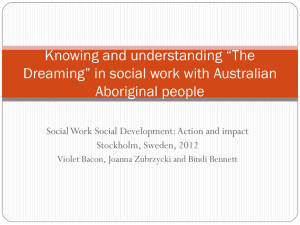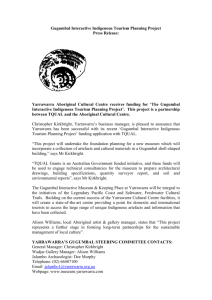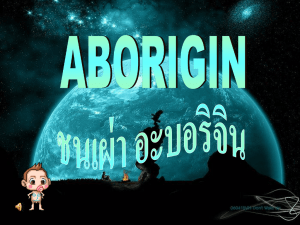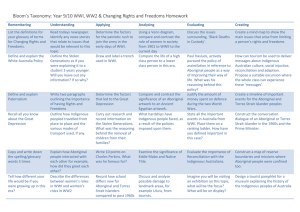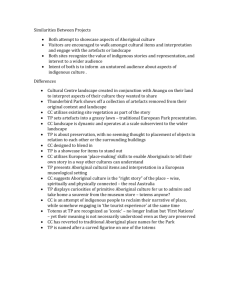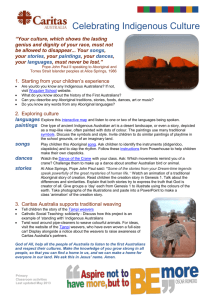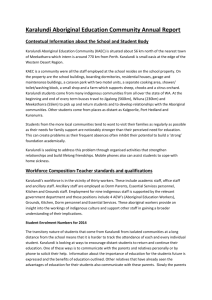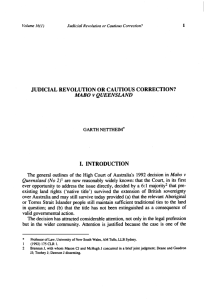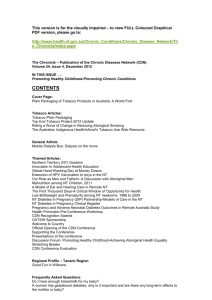to a document summary
advertisement
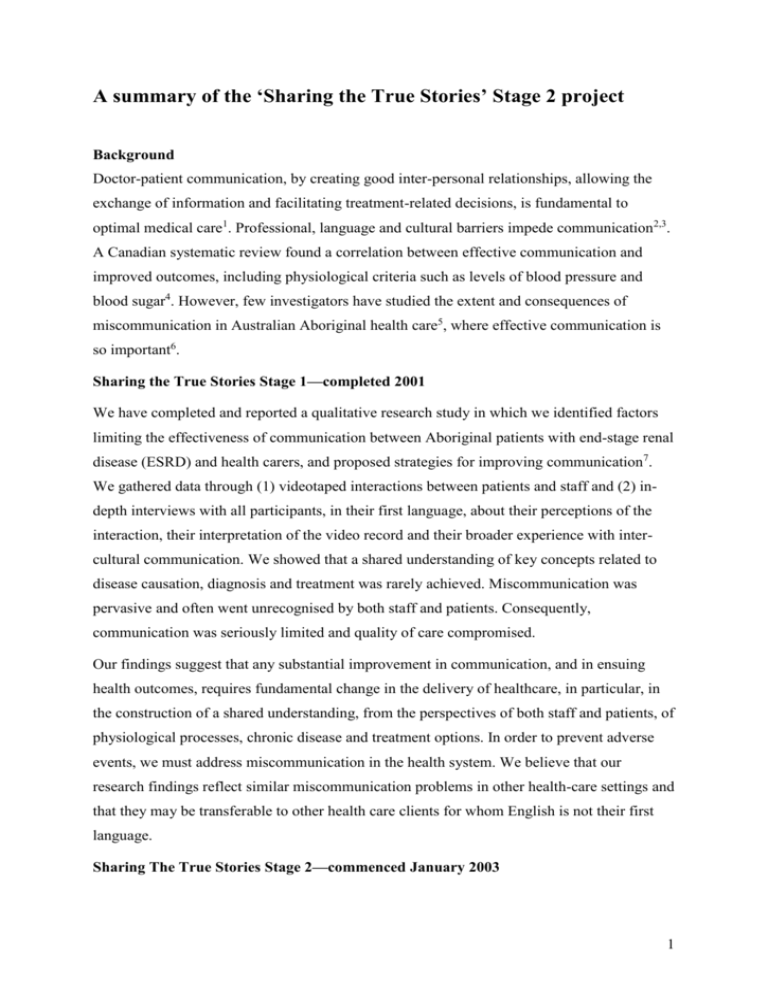
A summary of the ‘Sharing the True Stories’ Stage 2 project Background Doctor-patient communication, by creating good inter-personal relationships, allowing the exchange of information and facilitating treatment-related decisions, is fundamental to optimal medical care1. Professional, language and cultural barriers impede communication2,3. A Canadian systematic review found a correlation between effective communication and improved outcomes, including physiological criteria such as levels of blood pressure and blood sugar4. However, few investigators have studied the extent and consequences of miscommunication in Australian Aboriginal health care5, where effective communication is so important6. Sharing the True Stories Stage 1—completed 2001 We have completed and reported a qualitative research study in which we identified factors limiting the effectiveness of communication between Aboriginal patients with end-stage renal disease (ESRD) and health carers, and proposed strategies for improving communication7. We gathered data through (1) videotaped interactions between patients and staff and (2) indepth interviews with all participants, in their first language, about their perceptions of the interaction, their interpretation of the video record and their broader experience with intercultural communication. We showed that a shared understanding of key concepts related to disease causation, diagnosis and treatment was rarely achieved. Miscommunication was pervasive and often went unrecognised by both staff and patients. Consequently, communication was seriously limited and quality of care compromised. Our findings suggest that any substantial improvement in communication, and in ensuing health outcomes, requires fundamental change in the delivery of healthcare, in particular, in the construction of a shared understanding, from the perspectives of both staff and patients, of physiological processes, chronic disease and treatment options. In order to prevent adverse events, we must address miscommunication in the health system. We believe that our research findings reflect similar miscommunication problems in other health-care settings and that they may be transferable to other health care clients for whom English is not their first language. Sharing The True Stories Stage 2—commenced January 2003 1 In Stage 2 of this research, we intend to implement the strategies identified in Stage 1, and to evaluate their effectiveness in improving the quality of care. We will evaluate the effectiveness of interventions on parameters known to be associated with patient mortality and by monitoring the occurrence of significant adverse events. The Cooperative Research Centre for Aboriginal & Tropical Health has provided $251, 836 to stage 2. This will fund a half-time evaluator of Stage 2 projects, a half-time coordinator to facilitate the coordination and collaboration between stage 2 projects, Indigenous researchers, consultants (especially in Participatory Action Research), travel to remote Indigenous communities, and research dissemination and transfer. We aim to address key areas of change that include: 1. Shifting control—addressing the barriers to improving communication at both system and service levels through increased Indigenous participation in management processes and in structuring specific encounters. The specific objectives are: (1) to increase participation of clients and families in service planning and management through genuine and consistent collaboration (system level); (2) to increase opportunities for clients to initiate and structure interactions (service level); (3) to develop a more client-centred approach to renal care (integrating systems and service level change); and (4) to increase involvement of staff from relevant cultural and language groups. This will be funded by in-kind contributions of Top End Renal Services staff time by the NT Department of Health and Community Services. 2. Constructing shared understandings of key processes and concepts in renal care to enable Indigenous clients to make informed choices about their health care. We aim (1) to develop a sustainable and collaborative educational process and culturally appropriate educational materials which integrate Indigenous and biomedical perspectives and knowledge; and (2) to develop multilingual, multimedia resources for use by patients, their families, other community members, interpreters and health staff. AMGEN Australia Pty. Ltd., a core industry player in end-stage renal disease care, have provided $74,650 (plus GST) to support the development of these educational resources. 3. Improving communication practices in intercultural health care encounters through institutional support and strengthening staff expertise. We aim (1) to complete intercultural communication guidelines for health staff including guidelines for use of interpreters; (2) to improve communication strategies used within clinical encounters through development and 2 trial of tools for assessing communication risk and whether an interpreter is needed to achieve effective communication in a specific interaction; and (3) to develop and trial an intercultural communication training program for staff and interpreters working in renal care, and to identify and/or develop resources to support the training program. The Australian Council for Safety and Quality in Health Care have recently agreed to provide $50,000 towards the production of multi-media that can support training in intercultural communication—this grant will conclude in June 2003. This RHSET submission is for the use of this multi-media training materials and other strategies to improve intercultural communication and so overcome cultural barriers in service delivery for Indigenous people. References 1. Ong LM, de Haes JC, Hoos AM, Lammes FB. Doctor-patient communication: a review of the literature. Soc Sci Med 1995;40(7):903-18. 2. Putsch RW. Cross-cultural communication. The special case of interpreters in health care. Jama 1985;254(23):3344-8. 3. Dollis N, National Health Strategy (Australia). Removing cultural and language barriers to health. [Melbourne]: National Health Strategy, 1993. 4. Stewart MA. Effective physician-patient communication and health outcomes: a review. Cmaj 1995;152(9):1423-33. 5. Lowell A. Communication and cultural knowledge in Aboriginal health care. Darwin: Cooperative Research Centre for Aboriginal and Tropical Health., 2001. 6. Australian Royal Commission into Aboriginal Deaths in Custody, Johnston E. National report : overview and recommendations. Canberra: Australian Govt. Pub. Service, 1991. 7. Cass A, Lowell A, Christie M, et al. Sharing the true stories: improving communication between Aboriginal patients and healthcare workers. MJA 2002;176(10):466-470. Sharing the True Stories: improving communication between health staff and their Aboriginal clients Stage 2 Structure General Advisory Group Indigenous Advisory Group 3
